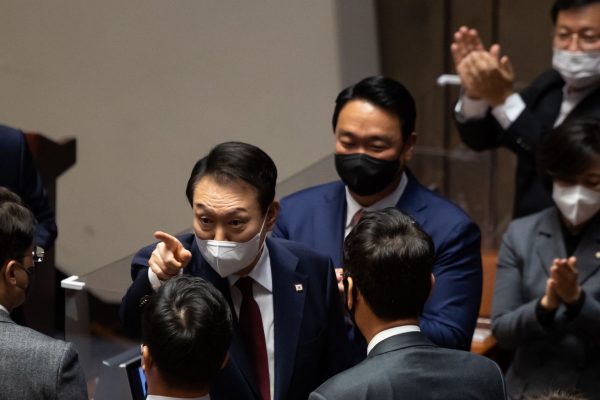President Yoon was broadcasted asking ‘wouldn’t it be darn embarrassing for Biden if those idiots at [the] legislature don’t approve [the Global Fund]?’ This was captured by a pool of South Korean media and aired by public broadcaster Munhwa Broadcasting Corporation (MBC). In the face of low domestic approval ratings, Yoon’s spokesperson insisted that ‘idiots’ referred to the opposition-controlled Korean National Assembly, not the US legislature, and that he didn’t say ‘Biden’ but actually ‘nal li myun’, which can be understood in Korean as meaning ‘if it’s thrown away’.
Putting aside the question of whether swearing at your own opposition is acceptable, Yoon tried to promote a more favourable interpretation of his statement while invalidating the judgment of the South Korean people and the credibility of MBC.
After initially denying the message, the president’s office and Yoon’s People Power Party (PPP) criticised MBC for being the first to broadcast the statement with subtitles. Joo Ho-young, the PPP’s floor leader, alleged that MBC did not undertake a fact-checking process to verify the report. Yet MBC’s reporting did not require fact checking because Yoon’s words were clear.
Lawmakers in the PPP along with members of the National Assembly’s Science, ICT, Broadcasting and the Communications Committee created a fact-finding taskforce and held a protest at the MBC headquarters. Kweon Seong-dong, a prominent PPP lawmaker and Yoon’s chief of staff when he was a presidential candidate, voiced his support for Yoon. He alleged that MBC damaged South Korea’s national interest, deceived the public by maliciously distorting the president’s statement and deliberately engaged in diplomatic self-harm.
The party also announced that it will sue MBC’s president, bureau chief, chief of digital news and one reporter for defamation and the dissemination of false information. Arguing that the media should safeguard the national interest is a slippery slope given the subjectivity of what constitutes national interest.
That the president made inappropriate comments in a public space — however much his office wants to argue that it was a private conversation — was disappointing but not unforgivable. Yoon should have apologised and moved past it. But what is more concerning now is not whether the President said Biden or ‘nal li myun’, or whether the ‘idiots’ referred to members of the US Congress. It is the concerted effort by the president, his administration and his party to viciously attack MBC to discredit the integrity of the company and silence their reporting.
Yoon is specifically targeting MBC despite other media outlets reporting similar facts to make an example of media control. His administration has a track record of targeting MBC. When he was the acting party representative and floor leader, Kweon Seong-dong blocked questions from MBC, accusing them of being controlled by the Korean Confederation of Trade Unions (KCTU) and being biased towards the Democratic Party. The KCTU is a progressive labour union that is often criticised by conservatives.
Yoon’s attack on MBC is only the latest manifestation of his cavalier attitude towards the media. At a question-and-answer session with reporters as a presidential candidate, a fervent supporter was heard telling him that he should pass on answering questions from the ‘leftist press’. Yoon obliged.
The simplified press conferences that Yoon promised to hold every day as president has become shorter and devolved into a mere formality as controversies over Yoon’s statements grew. Contrary to its original objective of improving communication, Yoon refused to take uncomfortable questions and even scolded reporters who asked critical questions. One such ‘press conference’ lasted only 43 seconds with 2 questions.
The Yoon administration’s attempt to suppress inconvenient questions appears systematic. In the press conference marking the 100th day of his presidency, the president’s spokesperson chose 12 reporters to ask a question. But to the surprise of many President’s Office correspondents, none of them inquired about the most sensitive and pressing domestic political issues surrounding Yoon, such as his law minister’s revision of the Enforcement Decree of the Prosecutors’ Office Act or controversies surrounding his wife.
For someone who claims to greatly emphasise ‘freedom’ — mentioning it 35 times in his inauguration speech and 21 times at his UN General Assembly speech — Yoon’s disregard for press freedom is striking. After the president’s office began attacking MBC, Yoon’s supporters have even begun doxing MBC reporters.
Political leaders are instigating attacks on specific media outlets and turning a blind eye to their supporters’ abuse of individual reporters. Yoon’s practices resemble those of populist and undemocratic leaders who gained political leverage through media oppression and manipulation. His actions threaten the media’s ability to hold political actors accountable and serve the public’s right to know, endangering South Korea’s democracy.
Soyoung Kim is a PhD candidate at the S Rajaratnam School of International Studies, Nanyang Technological University, Singapore.

